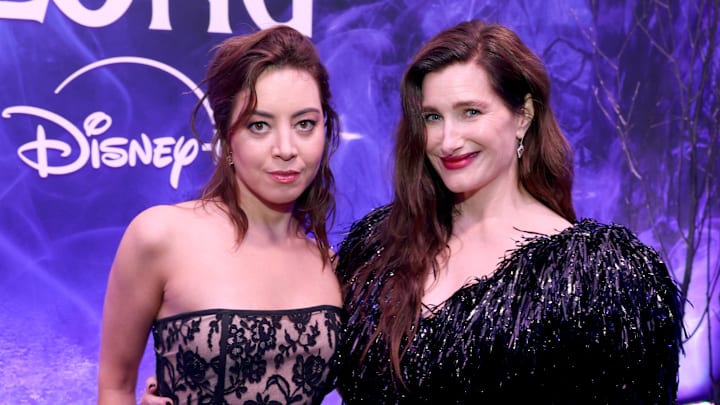With Agatha All Along’s Devil’s Night finale creeping up—the wickedest eve before Halloween—it’s clear Marvel didn’t play it safe from the very start. Right in the premiere, the MCU’s notorious anti-heroine, Agatha Harkness, did more than wrestle with old curses and coven betrayals; she shed her layers—literally and figuratively. Kathryn Hahn’s feral, power-stripped Agatha, appearing in a scene that boldly broke the MCU’s usual PG mold, served as a statement: this character is raw, wild, and unapologetically powerful.
But this wasn’t nudity for nudity’s sake. Hahn’s Agatha presented a layered act of defiance, standing bare not for the male gaze but for her own story. Agatha didn’t just strip down; she stripped away the MCU’s (and Disney’s) old armor against queer representation and female-driven narratives. After all, the Disney label hasn’t exactly been a warm, cozy tent for queer folk to camp out in. But Agatha All Along cracked the door open, inviting fans to a Hallow’s Eve where the Disneyverse shows it has a “witchy side.”
Marvel took a bold leap with Agatha All Along, letting Kathryn Hahn, in true witchy fashion, become the MCU’s first woman to bare it all. While Disney typically keeps its heroes under wraps, Agatha follows no rules but her own. Nods to witches beyond the Marvel world—like Glinda, the Wicked Witch of the West, and even Stevie Nicks—adds a wicked charm to the show. When Jennifer Hudson pointed out Hahn’s unique achievement, Hahn laughed, 'I didn’t know it at the time, but also to know it’s behind Thor is pretty great.' Hudson crowned the moment with a plaque—'First Woman To Show Butt in the MCU'—and Hahn was over the moon.
Bad Romance? Agatha and Lady Death's wicked courtship
And then, there’s Rio, aka Lady Death. Let’s be real: we all saw the hints long before the “big reveal.” Rio is a queer icon who strolls into Agatha’s life with as much grace as a wolf eyeing a deer. Their relationship is fire and ice—there’s the thrill, the chemistry, and a dangerous, seductive push-and-pull. Agatha and Lady Death don’t flirt like your average couple; their romance dances on the edge of survival and destruction. Agatha might be a “bad witch,” but Rio’s all about embracing her brand of fatal attraction. It’s a queer courtship as darkly twisted as it is refreshing.
There’s something beautifully symbolic in seeing Agatha, who’s been hunted down by the world for her powers, finding solace and fire with Rio—a character who’s Lady Death herself. When you’ve been flirting with death for centuries, it only feels natural that Agatha would find herself... well, rekindling an old spark. Their history runs deep, and as Agatha and Rio cross paths once more, it’s clear that some flames never fully die. It’s subversive and refreshingly unapologetic—a Marvel romance that says, “Wicked, meet Wicked-er.”
Bill Maximoff: A queer light in the shadows
And if we’re talking queerness in Agatha All Along, we can’t overlook Bill Maximoff. As Wanda’s son and a queer character, he’s a glimmer of LGBTQ+ visibility that Marvel fans have been longing for. Bill’s story subtly but powerfully addresses the layers of identity, heritage, and self-acceptance within the harsh reality of a world—and a franchise—that hasn’t always welcomed queer characters with open arms. As Devil’s Night approaches, Bill stands as a beacon for queer fans, even if he’s surrounded by the shadows of a complicated family legacy. And in the last episode, his appearance as Maleficent during the Witches' Road trial was breathtaking, a bold and unforgettable display of power and pride that only Bill could bring to life.
A devilish début for Disney
In a grand Devil’s Night finale, Marvel gifted Agatha a night to haunt the spotlight and a story that rattles Disney’s old rulebook. Agatha’s bold bare-all moment, her graveyard flirtation with Rio (Lady Death herself!), and Bill’s unapologetic queerness have carved Agatha All Along into uncharted Disney ground—a realm where power feels personal, and queer representation gets served up raw and spirited.
Agatha’s final journey feels less like a battle of spells and more like a declaration to the Disneyverse: queer characters don’t linger in the shadows—they revel in the spotlight. And in a show where witches are the outcasts, outlaws, and ultimate rebels, it feels right that the MCU’s newest vision of queer empowerment arrives with a devilish grin, a wicked laugh, and a fiercely unapologetic nod to every fan who’s waited for this night.
